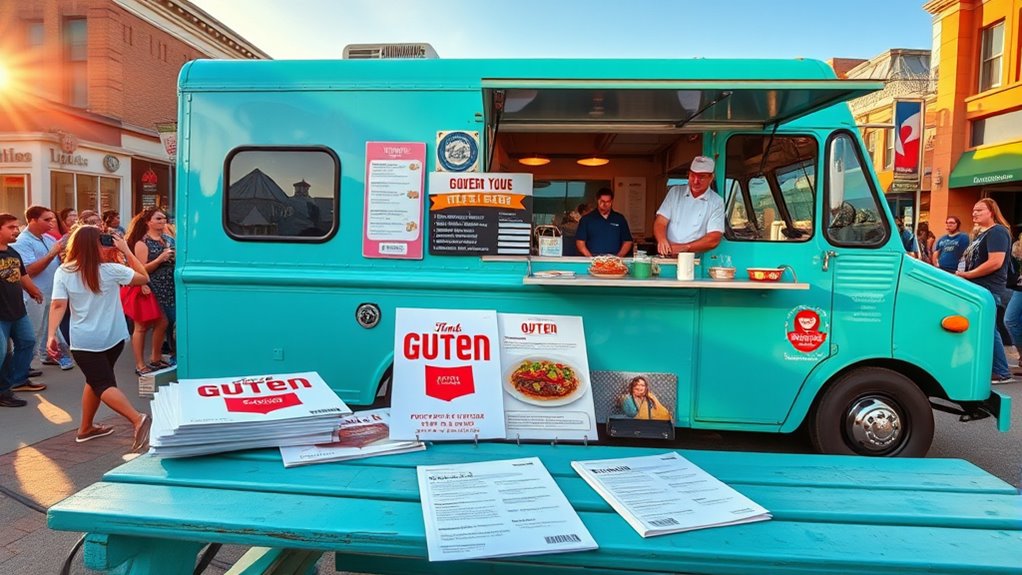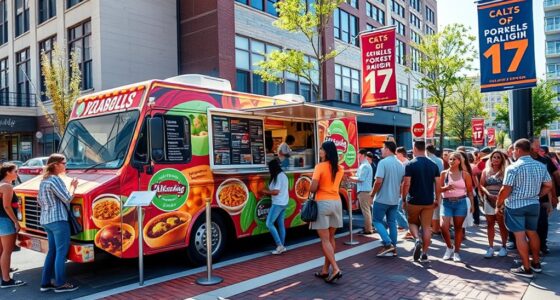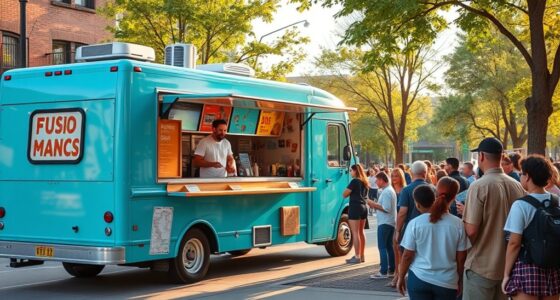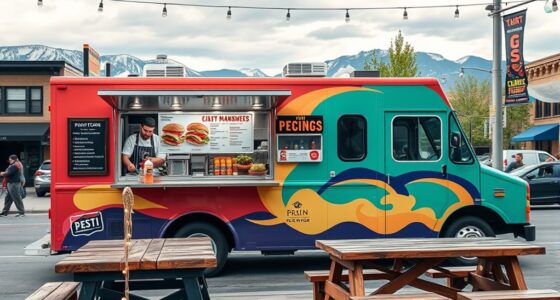To open a food truck in Ogden, Utah, you’ll need permits from the local health district, a business license, and a sales tax permit, plus make certain your staff has food handler permits. Costs vary from a few hundred to over $17,000 for permits and equipment, and location choices include private lots or public curb spots with zoning approvals. Developing a compelling menu and marketing plan is essential for growth. Continue exploring these steps to launch your successful food truck business.
Key Takeaways
- Obtain necessary permits from Weber-Morgan Health District, secure a business license, and register for sales tax to operate legally.
- Budget $40,000–$150,000 for truck costs, $20,000–$60,000 for outfitting, plus ongoing expenses for permits, insurance, and maintenance.
- Choose high foot-traffic locations like downtown or event venues, ensuring compliance with parking, zoning, and operating hours regulations.
- Develop an approved menu featuring portable, trendy, and allergen-labeled options, emphasizing food safety and local ingredients.
- Build your brand through social media, community events, collaborations, and attractive truck design to attract and retain customers.
Navigating Permits and Licensing Requirements in Ogden
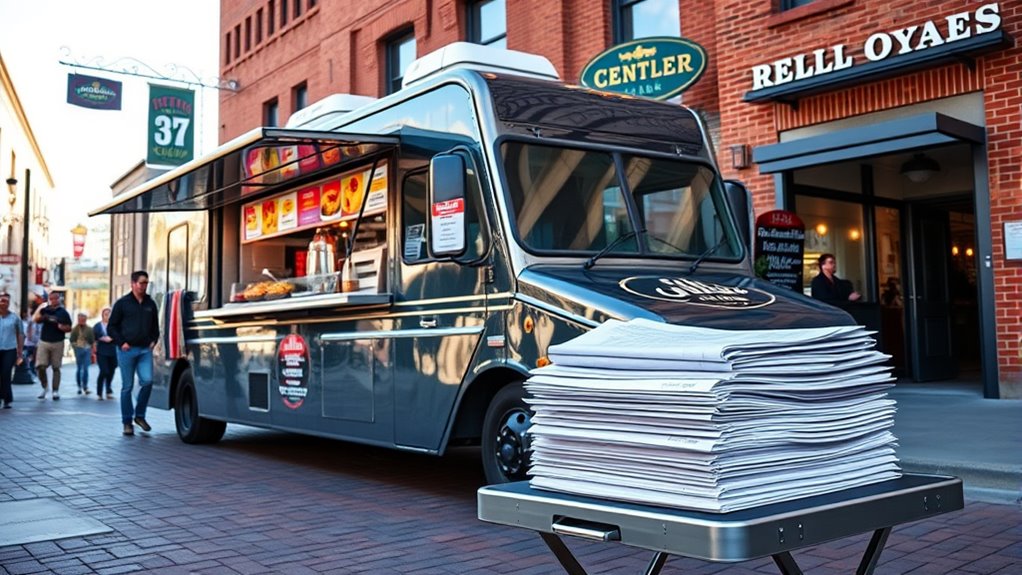
To operate a food truck in Ogden, you must navigate a series of permits and licensing requirements designed to guarantee safety and compliance. First, you need a Mobile Food Vendor Permit from Weber-Morgan Health District, obtained after passing a health inspection. You’ll also need a Business License from the city or county, costing between $50 and $200, and a Sales Tax Permit from the Utah State Tax Commission, which is free. Every employee must have a Food Handler Permit, costing around $22 each, and at least one certified Food Safety Manager is required, costing about $65. Along with these, you’ll submit detailed business info, proof of a valid Utah sales tax license, insurance, vehicle registration, and a site plan. Meeting these requirements ensures your food truck operates legally and safely in Ogden, which helps prevent fines and operational disruptions. Additionally, understanding local health regulations and staying current with any updates is crucial for ongoing compliance.
Estimating Startup and Operating Expenses for Your Food Truck
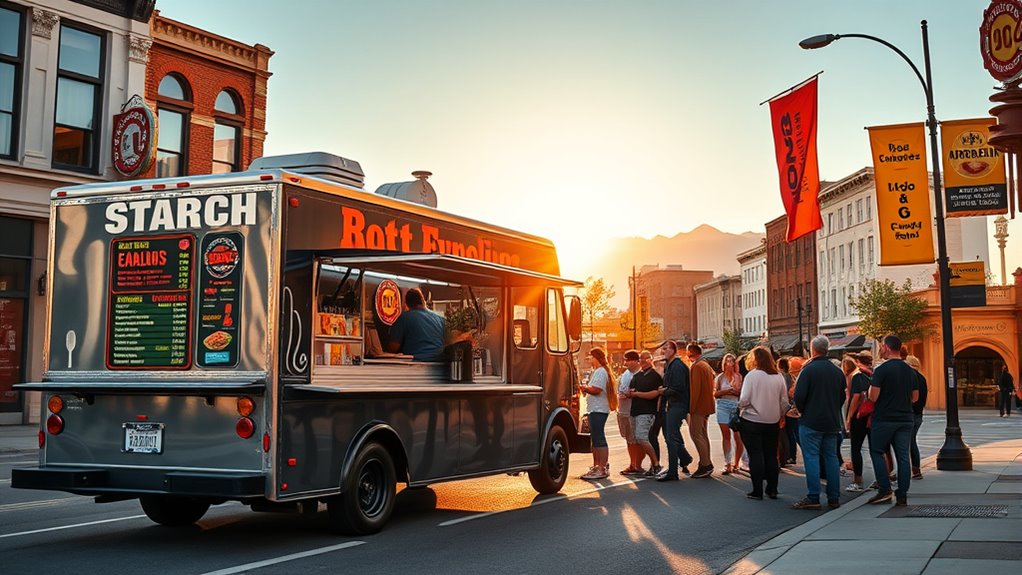
Estimating your startup and ongoing costs is key to launching a successful food truck in Ogden. You’ll need to account for equipment expenses like trucks, cooking gear, and safety systems, as well as licensing fees required by local regulations. Understanding these costs upfront helps guarantee your budget covers everything from the beginning and keeps your operation running smoothly. Additionally, securing appropriate insurance coverage is essential to protect your investment and comply with city requirements. Being aware of the expiration of vape juice and other perishable supplies can help you manage inventory and reduce waste effectively.
Startup Equipment Costs
Starting a food truck requires a clear understanding of the essential equipment costs involved. First, the truck itself can range from $40,000 to $150,000, depending on new or used status and customization. Second, kitchen outfitting, including grills, fryers, and prep stations, averages $20,000 to $60,000. Third, safety and ventilation systems, necessary for health codes, cost between $3,000 and $10,000. Fourth, upgrades like specialty ovens or smokers may add another $5,000 to $15,000. Fuel and maintenance costs approximately $500 to $1,000 monthly, influenced by usage. These initial investments are vital for setting up a fully functional, compliant, and efficient food truck ready to serve customers. Proper planning ensures that all equipment meets health and safety standards and operates smoothly from the start. Additionally, understanding projector technology can help you choose equipment that enhances your operation’s visual presentation and branding efforts.
Operational Licensing Expenses
Understanding the costs of licensing and permits is essential when launching your food truck business. These expenses vary widely depending on local regulations. In Ogden, you’ll need health permits, vehicle permits, and possibly fire inspections. Expect costs to range from $590 to over $17,000, depending on your specific permits. Renewal fees and compliance costs add to your ongoing expenses, so budget accordingly. Additionally, being aware of bedroom design elements can help you create a comfortable and inviting space if you plan to have a dedicated area for staff or storage.
Choosing the Best Locations and Understanding Operating Rules
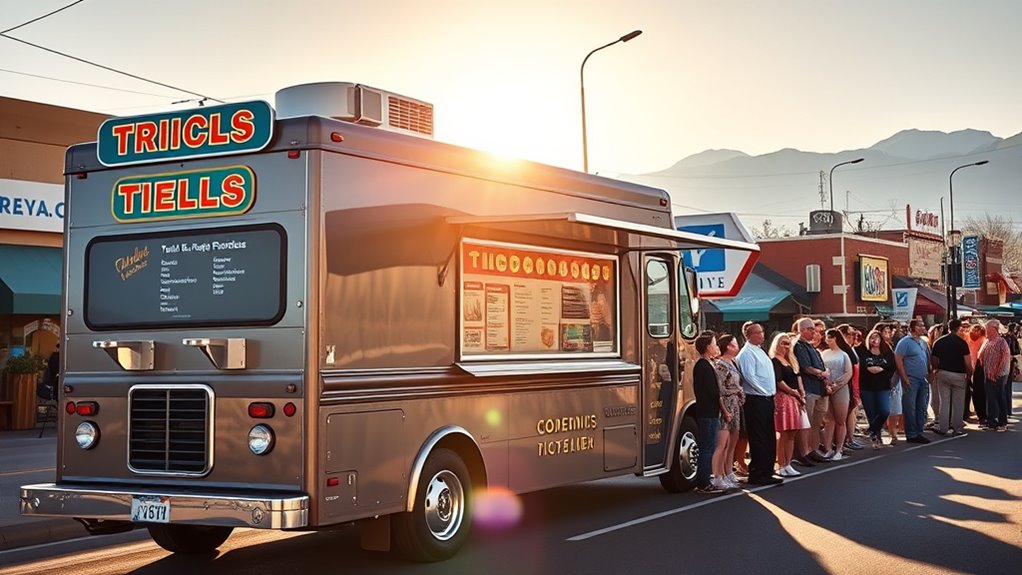
Choosing the right locations for your food truck in Ogden is essential to guarantee smooth operations and compliance with local regulations. First, focus on permitted spots like private parking lots with property owner approval or public curbs where zoning allows. Second, avoid residential zones unless during special events on private property. Third, ensure your spot aligns with Ogden’s parking laws—mind time limits and stall sizes. Fourth, secure permission if operating in front of brick-and-mortar restaurants or near religious facilities. Be aware of operating rules: only one truck per linear block daily, work between 7:00 AM and 10:00 PM, and stay within legal parking spots. Keep your setup neat, avoid idling, and respect noise ordinances to maintain good community relations. Additionally, mobile food trucks must be parked parallel to the curb, and when operated within the public right-of-way, they must not be unhitched or left unconnected from the tow vehicle. It is also beneficial to understand relationships that influence community support and customer loyalty, ensuring a positive reputation in your chosen locations.
Developing a Compliant and Appealing Menu
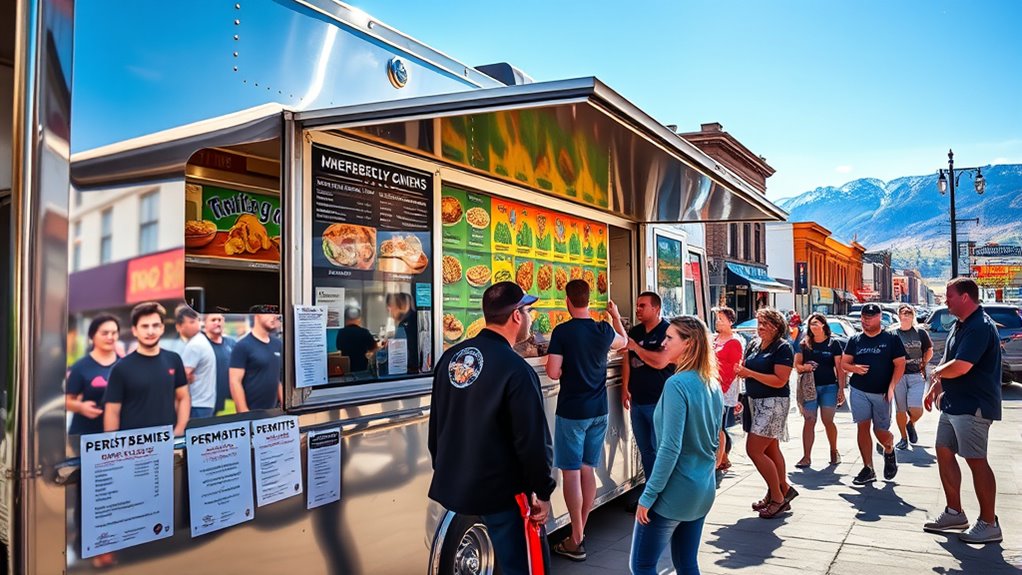
Creating a menu that meets Utah’s food safety regulations is essential, so make sure to submit your menu to the health department and follow proper handling practices. Incorporate local ingredients and clear allergen labeling to boost customer trust and comply with standards. To attract customers, focus on creative, portable options that offer variety and reflect current food trends. Additionally, practicing mindful organization in your kitchen can help streamline food prep and maintain compliance.
Menu Regulations and Safety Standards
Developing a compliant and appealing menu for your food truck in Ogden requires careful attention to regulations and safety standards. To guarantee compliance, focus on these key areas:
- Submit clear menu items with product lists during permit applications, aligning with health department requirements.
- Use only approved ingredients and preparation methods that meet licensing rules, including restrictions on alcohol sales.
- Ensure all menu offerings can be safely prepared and stored within your commissary or truck, following safety protocols.
- Label foods accurately and include allergen information, complying with state labeling laws to protect consumers and limit liability.
- Incorporate self-watering plant pots to create a sustainable and eco-friendly environment, which can also enhance the aesthetic appeal of your food truck.
Local Ingredient Sourcing and Labeling
Sourcing ingredients locally not only supports sustainability and reduces transportation costs but also allows you to offer fresher, higher-quality menu items that attract discerning customers. To capitalize on this, establish relationships with regional farms and producers in Ogden and Weber County, ensuring a steady supply. Keep in mind that seasonality affects ingredient availability, so adapt your menu accordingly. Proper labeling is essential for compliance with Utah Food Labeling Requirements, which mandate clear identification of ingredients and disclosure of artificial additives or preservatives. Highlighting local sourcing on menus and signage builds trust and appeals to community-conscious customers. Be diligent in verifying supplier information, regularly review regulations, and balance label detail with readability, ensuring your menu remains compliant, transparent, and enticing. Additionally, understanding labeling requirements helps prevent inadvertent misbranding and ensures your menu communicates accurately with customers. Incorporating local ingredient sourcing can also serve as a unique selling point that differentiates your food truck in the competitive Ogden market.
Creative Menu Offerings and Variety
A well-rounded menu balances popular crowd-pleasers with distinctive dishes that set your food truck apart in Ogden’s competitive scene. To do this effectively, consider these key points:
- Offer a mix of familiar favorites and unique options to attract diverse customers.
- Include dietary choices like vegetarian, vegan, or gluten-free to broaden appeal.
- Introduce seasonal or limited-time dishes to generate excitement and repeat visits.
- Provide customizable meals and value-packed combos to enhance customer satisfaction and convenience.
- Regularly check and maintain your equipment to ensure food safety and efficient prep, especially if your menu includes items like bicycle tire pressure tools or other specialized equipment, to prevent delays and uphold quality standards.
Ensure all menu items comply with health and safety regulations, such as proper gloves or utensils, and avoid complex prep that your truck can’t safely handle. Clear, appealing descriptions and attractive presentation will keep customers engaged and coming back for more.
Effective Marketing and Community Engagement Strategies
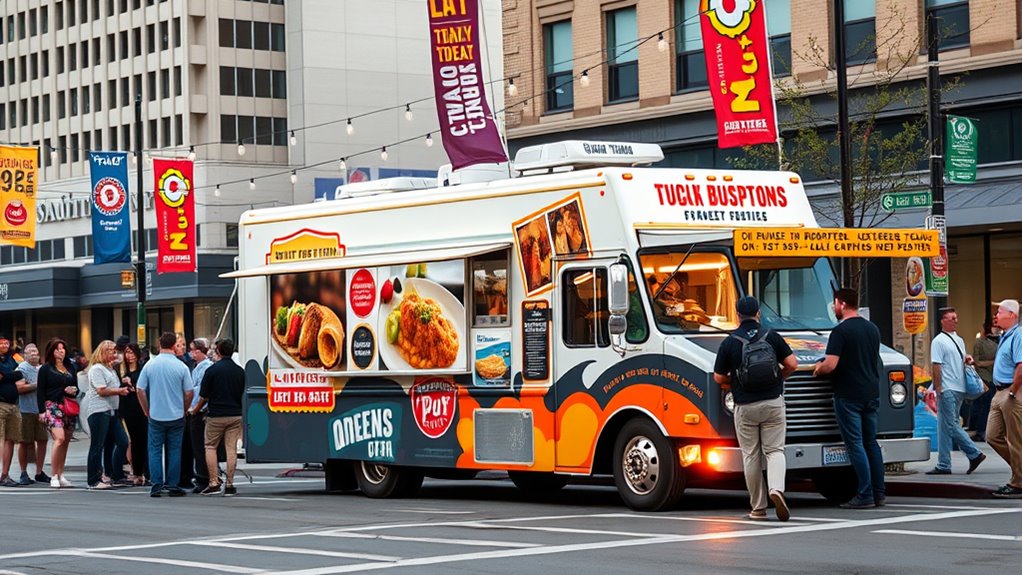
Effective marketing and community engagement are essential for a food truck’s success in Ogden, Utah. You want a strong, consistent brand identity with a memorable logo, eye-catching truck design, and messaging that resonates locally. Share your story—what makes your truck unique—to build emotional loyalty. Use storytelling across your website, social media, menus, and packaging to deepen connections. Participate in local festivals, farmers markets, and collaborate with nearby businesses for cross-promotions that expand your reach. Distribute samples, flyers, and branded merchandise to create personal ties and increase visibility. Maintain active social media profiles, post high-quality photos, and run promotions aligned with local events and holidays. Building relationships within the community fosters trust, loyalty, and long-term success for your Ogden food truck. Understanding Your Market is crucial; targeting the younger demographic under 45 can significantly boost your visibility and patronage. Additionally, cultivating spiritual energy through community involvement and authentic storytelling can create a more meaningful connection with your audience, enhancing loyalty and support.
Ensuring Safety, Insurance, and Regulatory Compliance
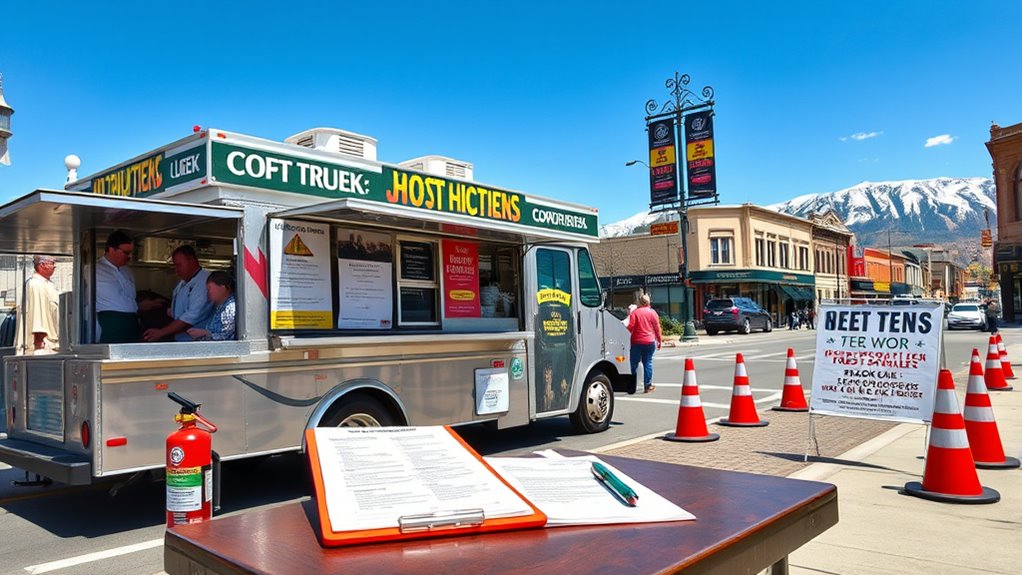
Ensuring safety, insurance, and regulatory compliance is crucial for the success and legality of your food truck operation in Ogden, Utah. You must:
- Obtain valid permits from the local health department, including a business license and truck-specific permits.
- Use an approved commercial commissary kitchen and pass health inspections before opening.
- Meet fire safety standards by installing proper suppression systems and passing fire department inspections.
- Secure insurance coverage that complies with Utah law, covering liability, property, and vehicle risks, and submit proof with your applications.
Additionally, you’ll need to complete agreements for commissary access, restroom facilities, and follow signage and operating hour rules. Staying compliant ensures your business runs smoothly and safely.
Tips for Successful Food Truck Operations in Ogden

Choosing the right locations is essential for your food truck’s success in Ogden. Focus on high foot-traffic areas like downtown, Weber State University, and event venues to maximize visibility. Rotate locations regularly while maintaining a consistent schedule to build customer loyalty. Participating in farmers’ markets, festivals, and rallies can boost sales by up to 20%. Research competitors and identify underserved neighborhoods to fill gaps. Secure permits early, as zoning rules impact where trucks can operate. The industry’s rapid growth and consumer demand for diverse, convenient dining options make location strategy even more critical for sustained success. Location Strategy | Implementation Tips | ———————|———————| | High-Traffic Spots | Target busy areas, rotate locations | | Community Events | Join markets, festivals, rallies | | Underserved Areas | Research and fill niche needs | | Permits & Regulations | Secure early to avoid delays | | Consistent Schedule | Build loyal customer base
Frequently Asked Questions
How Long Does the Permit Approval Process Typically Take in Ogden?
You’re probably wondering how long the permit approval process takes in Ogden. Typically, standard vendor permits are processed within 2-3 weeks, but food vendor permits can take 3-4 weeks because of health inspections and approvals. If you need to start sooner, you can opt for expedited processing, which takes about 5-7 business days. To avoid delays, verify all your paperwork and requirements are complete and submitted promptly.
Are There Any Restrictions on Alcohol Sales From a Food Truck in Ogden?
You wonder if there are any alcohol sales restrictions from food trucks in Ogden? The answer’s simple: Utah law firmly forbids food trucks from selling alcohol under any circumstances. You can’t legally serve or sell beer, wine, or spirits from your mobile food operation. Strict state and city standards exclude alcohol licenses for trucks, so your focus must stay on food, not alcohol, ensuring compliance and avoiding costly legal complications.
Can I Operate My Food Truck Year-Round in Ogden’S Climate?
You can operate your food truck year-round in Ogden’s climate, but you’ll need to prepare for cold winters, snow, and occasional rain. Installing weatherproofing, reliable heating, and snow removal plans will keep your business running smoothly. Summer heat requires ventilation and hydration strategies. Adjusting your menu seasonally and marketing during winter events can help maintain customer interest, ensuring your food truck stays active throughout the year despite weather challenges.
What Are the Specific Noise Level Limits for Operating During Evening Hours?
They say “silence is golden,” and in Ogden, that couldn’t be more true during evening hours. You must keep noise from your food truck below the level “audible at residential property lines” between 10:00 P.M. and 7:00 A.M. This means avoiding loud music or amplified sound that can be heard from a distance, especially during restricted hours. Be mindful of your noise, and you’ll stay on the right side of the law.
Do I Need Additional Permits for Special Event Vending in Ogden?
You do need additional permits for special event vending in Ogden. You’ll have to apply for event-specific permits, coordinate with health and event authorities, and guarantee you have the proper health certifications, liability insurance, and fire safety equipment. Submitting your application at least 45 days before the event is vital. Make sure your vending location is approved and comply with all rules, including noise, alcohol, and private property permissions if applicable.
Conclusion
Starting your food truck in Ogden is like planting a seed—you’ll need the right permits, a solid plan, and community engagement to help it grow. Stay compliant, adapt to local rules, and create a menu that excites. With dedication and smart marketing, your food truck can become as beloved as Ogden’s scenic mountains. Keep your passion fueled, and watch your culinary journey flourish just like a well-tended garden.
